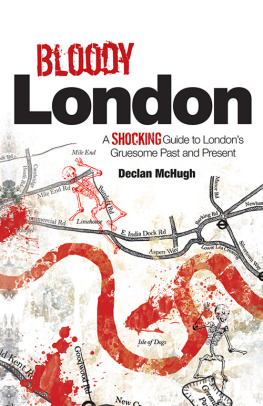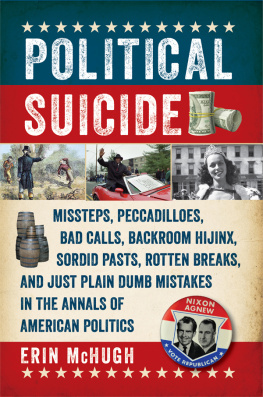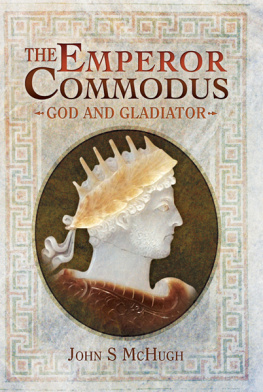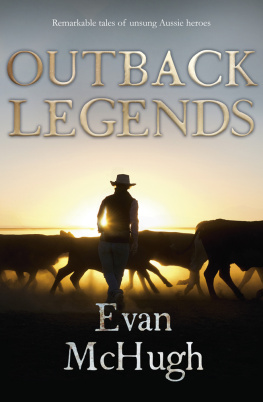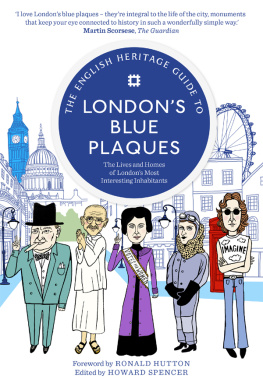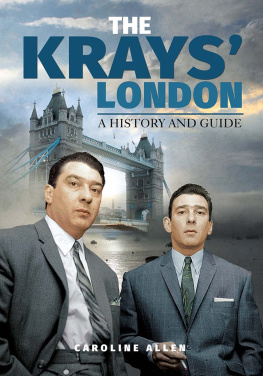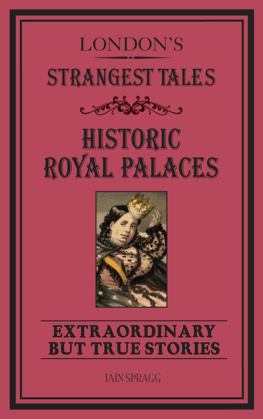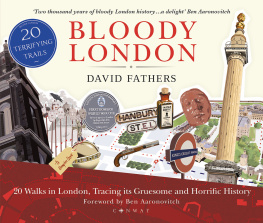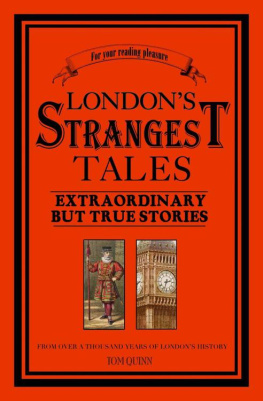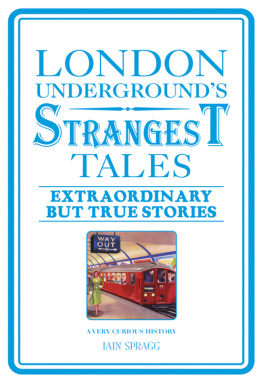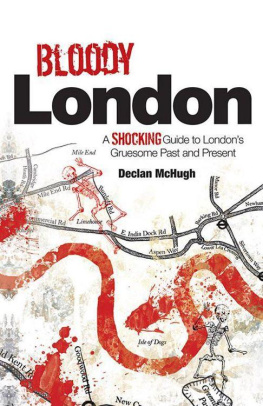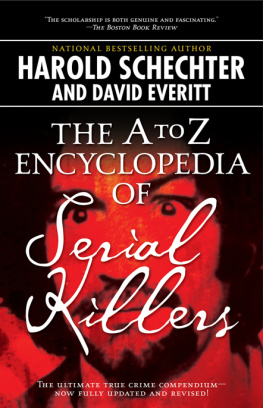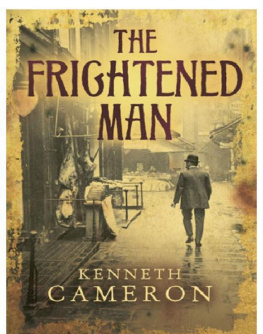bloody
london
A shocking guide to Londons gruesome past and present
Declan McHugh

Bloody London: A shocking guide to Londons gruesome past and present
Declan McHugh
This epub edition is published in 2012 by Crimson Publishing
Crimson Publishing, Westminster House, Kew Road, Richmond, Surrey TW9 2ND
Crimson Publishing, 2012
Epub edition 2012 ISBN: 978-1-78059-123-0
The author has asserted his moral rights to be identified as the author of this work in accordance with the Copyrights, Designs and Patents Act 1988.
British Library cataloguing in Publication data
A catalogue record for this book is available from the British Library
All rights reserved under International and Pan-American Copyright Conventions. By payment of the required fees, you have been granted the non-exclusive, non-transferable right to access and read the text of this ebook on-screen. No part of this text may be reproduced, transmitted, downloaded, decompiled, reverse engineered, or stored in or introduced into any information storage and retrieval system, in any form or by any means whether electronic or mechanical, now known or hereinafter invented, without the express written permission of Crimson Publishing ebooks.
Epub file created by RefineCatch Ltd, Bungay
Dedicated to the memory of my mother, Nan
CONTENTS
In the last thirteen years I have performed my The Blood and Tears Walk ( www.shockinglondon.com ) for tens of thousands of people from all over the world. The tour covers the dark side of Londons history and uses a combination of detailed research and acting skills to try to create stories that are immediate, vivid, sometimes horrifying, sometimes frightening, but hopefully always interesting and real.
It is time to put some of the shocking, scary and tragic events in Londons history, and the people behind those events, into book form.
This book encompasses a huge range of material ranging across the centuries from Jack the Ripper and many other London serial killers, to execution sites, to the occult, to disasters, to prisons, to grave-robbers and much, much more.
For each gory tale I take you to the place in question, I show you what you can see there now and, where possible, I suggest somewhere where you can soak up the atmosphere and read about the terrible events if you dare!
I am confident that within these pages you will find stories that will inform, entertain and, yes, shock you.
Id like to thank Crimson Publishing, and Hugh Brune in particular, for believing that I was the right person to write this book for them.
I also want to thank the three girls in my life: Ruth, and our two daughters, Bunny May Margaret, and Trixie Anna Catherine.
Declan McHugh, April 2012, London
1
1) Corams Fields
93 Guilford Street, London, WC1N 1DN. The park is open all year round from 9a.m. until dusk and is free and open to children and young people under 16. Tube: Russell Square.
The Foundling Museum is at 40 Brunswick Square, London WC1N 1AZ. Tube: Russell Square. Tel: 020 7841 3600. Open Tuesday to Saturday 10a.m.-5p.m. Sunday 11a.m.-5p.m. Prices: Adult: 7.50 (8.25 including Gift Aid), Concession: 5 (5.50 including Gift Aid), free admission for children up to 16 years. Be sure to have a look at the statue of Thomas Coram outside the Foundling Museum. Website: www.foundlingmuseum.org.uk.
The Corams Fields site is less than 10 minutes walk from Russell Square tube station. Leave that tube station and cross the street. Turn right and keep walking; after a few minutes you pass a mini-roundabout and the road twists round to the right. Keep walking and at the street end turn left into Guilford Street and walk along the side of a long white building. Soon you will pass a stone structure with two pillars framing an alcove this little alcove is the actual place in the early period of the hospitals existence which held a basket into which an unwanted child could be placed at any hour of the night. The actual entrance now for the public to enter Corams Fields park is a small gate just a few seconds further on.
To enter the Fields themselves there is a pleasantly child-centric rule: every adult must be accompanied by a child. If you have no child with you, you can still visit the museum at 40 Brunswick Square which is back where the mini-roundabout was.
THE MAN WHO SAVED BABIES
In the early eighteenth century almost 1,000 illegitimate babies and infants were being abandoned in London each year. Dead and dying babies could be seen daily by the side of streets, either dumped by their parents (usually the mother who had been undone by a man), or left to fend for themselves. Very few were rescued.

This infanticide was a national disgrace and one man refused to turn a blind eye to it Thomas Coram. Thomas observed these pathetic throwaways while travelling from Rotherhithe, where he lived, to central London. It is probably not a coincidence that Coram himself had not had the happiest of childhoods. His mother had died when he was 7 and his father had sent him to sea before he was 12 years old, but he had returned triumphantly from America in 1719 a rich, self-made man.
Back in London, Coram found evidence everywhere of the abandonment of babies and was so shocked he resolved to create a hospital for the maintenance and education of exposed and deserted young children.
Coram was, in effect, the Barnardo of the infants (almost 150 years later Dr Barnardo would become famous for his mission to rescue impoverished children and teenagers who were living rough in slums, on roof-tops and in all kinds of nooks and crannies in the East End).
For the next two decades after his return to England Coram campaigned to establish Londons first and, for over 100 years, only home for abandoned foundling (illegitimate) children. When he was 70 years of age Coram was still tramping 10 or 15 miles a day around London seeking support and patronage for his dream. After 20 years of exhortations and constant petitioning, the home (or hospital as they called it) was finally established in 1739.
Thomas Coram could be difficult to deal with and sadly in 1742 Coram and his hospital parted ways, but plans for the hospital itself surged ahead.
Corams vision was shared and endorsed by two other men more famous than himself composer George Handel, and painter and satirist William Hogarth. Annual performances of Handels Messiah raised the equivalent of over 500,000 in todays money for Corams ambitious and expensive scheme. Meanwhile Hogarth (who knew plenty about child neglect his famous print Gin Lane shows a toddler falling out of its drunken mothers negligent arms) set up a collection of paintings by well-known artists, the first exhibition space in Britain.
Different methods of admission were tried including first come, first served, balloting, and even, at one point, admitting absolutely everybody that applied. This last period lasted from 17561760 and is a blot on the hospitals record because granting admission to every single child led to massive overcrowding. Of the fifteen thousand children admitted only 4,300 lived to the age of 15. Also a nasty trade grew up in transporting infants to Corams from all over the UK. Many infants died when the couriers pocketed the money and left the infants to die a melancholy irony since the hospital was set up to avoid exactly this.

